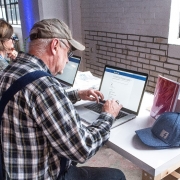AUSTRALIAN BUSINESSES ARE INNOVATION LEADERS
Australia has been a standout performer when it comes to innovation, according to a recent study.
A new study commissioned by Microsoft and conducted by IDC Asia Pacific, found that more Australian businesses are leaders in a culture of innovation (32%) compared to the rest of their Asia Pacific counterparts, at an average of 8%.
The study involved a survey of more than 3,000 business and IT professionals in the Asia Pacific within a six month period before the pandemic and since it happened. In it, 45% of Australian businesses saw that COVID-19 offered them an opportunity to innovate.
Microsoft Australia Chief Technology Officer Lee Hickin told Business Insider Australia a ‘culture of innovation’ encompasses a variety of factors including employees, processes and the customer or output of what you do.
“To me, it’s that pure ability to adapt to a changing situation quickly and recognise pathways that aren’t working and move out of that,” he said, adding that it all begins with a leader who talks about innovation and opens up the opportunity for it to happen.
So why exactly did Australia stand out when it came to innovation? Hickin pointed to the way it has been handling the pandemic so far. Despite the second lockdown in Melbourne, constant border closures and reopenings between states, and the recent coronavirus cluster in Sydney’s northern beaches, Australia has managed to keep its coronavirus cases low compared to other countries.
“Australia is a standout country in our ability to quickly adapt to the problems of what COVID introduced,” Hickin said. “As a country – even though we’re states and territories º we come together as a single federal approach and we all agreed and there was none of that infighting which I think ultimately leads to a nervousness in our commercial channels.”
“I think the reason why Australia stands out is because our government and our approach was so rapid, so quick, and so comforting to that economic market, that they can see and [say] it’s safe for us to make some bets now because we have this kind of comfort zone,” Hickin added.
Creating a new baseline
Hickin acknowledged that most organisations had already been thinking about a digital strategy before COVID sped up their process. Companies rolled out several new practices as a result, whether that was allowing remote work for employees, deciding to use food delivery services or switching some of their storefronts into dark stores to fulfil more orders.
Innovation also extended to new technologies, for example La Trobe University using a HoloLens 2 mixed reality headset and CT scans of a coronavirus-infected patient’s lungs to create a virtual 3D model of the infected organs to get more insights into the disease. Hickin said doing this creates a new benchmark that other industries can build upon.
“What happens is with any of these adoptions of technology, you create a new baseline,” he said. “You move the bar up slightly and say, okay, this is now what is acceptable and can be done.”
Another trend Microsoft noted in Australia is organisations that wouldn’t typically look to other industries for advice start to look over to a whole range of sectors for inspiration.
“This is kind of that Australian mateship mindset where we look around each other and go, ‘Well, what are you doing? How can I learn from you?’”
There are two major elements Hickin wants business leaders to take away from this report. The first is not assuming that technology and tools are the only things you need – your staff are another priority. The second is that the report provides “a sense of hope” in Australia’s status as a leader in innovation.
“We are a small country in terms of the broader global economic landscape, but we are a major player in innovation, transformation and a country that can pull its way out of a situation like this,” Hickin said.













